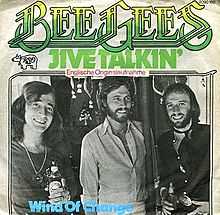Jive Talkin'
| "Jive Talkin'" | |||||||
|---|---|---|---|---|---|---|---|
 | |||||||
| Single by Bee Gees | |||||||
| from the album Main Course | |||||||
| B-side | "Wind of Change" | ||||||
| Released | 31 May 1975 | ||||||
| Format | Vinyl record (7" 45 RPM) | ||||||
| Recorded |
Criteria Studios, Miami, Florida, 30 January — 19 February 1975 | ||||||
| Genre | Funk,[1] disco[2] | ||||||
| Length |
3:44 (album version) 3:33 (single version) | ||||||
| Label | RSO | ||||||
| Writer(s) | Barry, Robin & Maurice Gibb | ||||||
| Producer(s) | Arif Mardin | ||||||
| Bee Gees singles chronology | |||||||
| |||||||
| |||||||
"Jive Talkin'" is a song by the Bee Gees, released as a single in 31 May 1975 on RSO. This was the lead single from the album Main Course which hit number one on the Billboard Hot 100 and reached the top-five on the UK Singles Chart in the summer of 1975. Largely recognised as the group's "comeback" song, it was their first US top ten hit since "How Can You Mend a Broken Heart" in 1971.
Recording
By 1975, the Bee Gees assembled a studio group consisting of Alan Kendall on electric guitar, Blue Weaver on keyboards and Dennis Bryon on drums. This combination, with Maurice Gibb on bass and Barry Gibb on rhythm guitar, recorded all the Bee Gees albums of the late '70s and also went on tour with the group. Recording for "Jive Talkin'" took place on 30 January and 2 February 1975. The scratchy guitar intro was done by Barry and the funky bass line provided by Maurice.
The song was originally called "Drive Talking". The song's rhythm was modelled after the sound their car made crossing the Julia Tuttle Causeway each day from Biscayne Bay to Criteria Studios in Miami.[3]
According to Maurice, while hearing this rhythmic sound, "Barry didn't notice that he's going 'Ji-Ji Jive Talkin'', thinking of the dance, 'You dance with your eyes'...that's all he had...exactly 35mph...that's what we got." He goes on to say, "We played it to Arif [producer Arif Mardin], and he went 'Do you know what "Jive Talkin'" means?' And we said 'Well yeah, it's, ya know, you're dancing.' He says 'NO...it's a black expression for bullshitting.' And we went 'OH, REALLY?!? Jive talkin', you're telling me lies...' and changed it". Maurice goes on to describe how Arif gave them "the groove, the tempo, everything." Robin Gibb then goes on to mention that, because they were English, they were less self-conscious about going into the "no go areas", referring to musical styles that were more black in styles, etc. He then said, "We didn't think that there was any 'no go' areas, it's music!"
Release
Upon its release to radio stations, the single was delivered in a plain white cover, with no immediate indication of what the song's name was or who sang it. The DJs would only find out what the song was and who played it when it was placed on the turntable; RSO did provide the song with a label on the record itself. It was the second time in the band's career that this strategy had been employed to get airplay for their music, after a similar tactic had popularized their debut US single "New York Mining Disaster 1941" in 1967.
The original studio version was included on the Saturday Night Fever soundtrack, as it was used in a scene that was cut from the final film. Later pressings of the album used the live version of "Jive Talkin'" from the Bee Gees 1977 album, Here at Last... Bee Gees... Live due to contractual distribution changes. The CD version restores the use of the studio version.
Cover versions
- In 1975, the funk band Rufus covered "Jive Talkin'" on their album Rufus featuring Chaka Khan.
- In 1987 this song was covered by the Boogie Box High. Boogie Box High was a musical project by Andros Georgiou in the late 1980s, that featured a range of vocal collaborations such as his relative George Michael (of Wham!) and Nick Heyward (of Haircut One Hundred). The cover was their biggest hit in 1987.
- On Iron Maiden's song "More Tea Vicar", towards the end, Bruce Dickinson sings a bit of the song in a voice imitating The Bee Gees as a joke, then follows it up with "No, no no! You got the wrong track, you have to go in the studio next door." Then sings "Okay" in a Bee Gees voice.
Chart performance
| |||||||||||||||||||||||||||||||||||||||||||||||||||||||||||||||||||||||||||||||||||||||||||||||||||||||||||||||||||||||||||||||||||||||||||||||||||||||||||||||||||